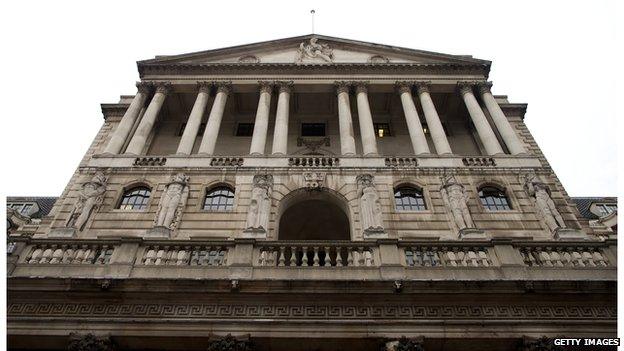UK interest rates held at record low of 0.5% for another month
- Published

The Bank of England has held UK interest rates at a record low of 0.5% for another month.
The size of the Bank's economic stimulus programme - quantitative easing - was also unchanged at £375bn.
Debate over the timing of a rate rise has intensified, with Bank governor Mark Carney hinting recently that it could come by the end of this year.
Details of why the Bank's Monetary Policy Committee (MPC) held rates will be published later this month.
In the minutes of the previous MPC meeting in July, all nine members of the committee voted to keep rates on hold.
Policymakers noted that while "employment had continued to increase robustly... wage growth had been surprisingly weak". There was also concern about weakening economic growth overseas.
The minutes for the latest MPC meeting are not due to be released until 20 August. If they reveal that some policymakers voted in favour of a rate rise it will be the first time the committee has been split since July 2011.
UK interest rates have been at 0.5% for five years. However, in June, Mr Carney said that interest rates could start to rise sooner than financial markets expected.
Most commentators had forecast that the first rate increase would come early next year.
Higher rates 'unjustified'
Chris Williamson, chief economist at Markit, said that he expects "the minutes to show that opinion is moving closer towards raising rates".
"It's all about when wage growth starts to pick up: if pay starts to rise in coming months, the first rate hike looks likely in November. Otherwise, any tightening of policy can wait until next year," he said.
But David Kern, chief economist at the British Chambers of Commerce, warned that a rate rise soon would damage economic growth.
"The current calls for higher rates, particularly while wage pressures are still weak, are unjustified," Mr Kern said.
He added: "The rise in sterling over the past year has put pressure on UK exporters, and is equivalent to a tightening in monetary policy. This strengthens the case against premature interest rate rises."
Recent economic surveys have suggested the UK service sector is continuing to grow robustly, although there are signs that growth in the manufacturing sector has slowed.
Figures released on Wednesday showed that UK manufacturing output rose by 0.3% in June, a smaller increase than expected, following a 1.3% decrease in May.